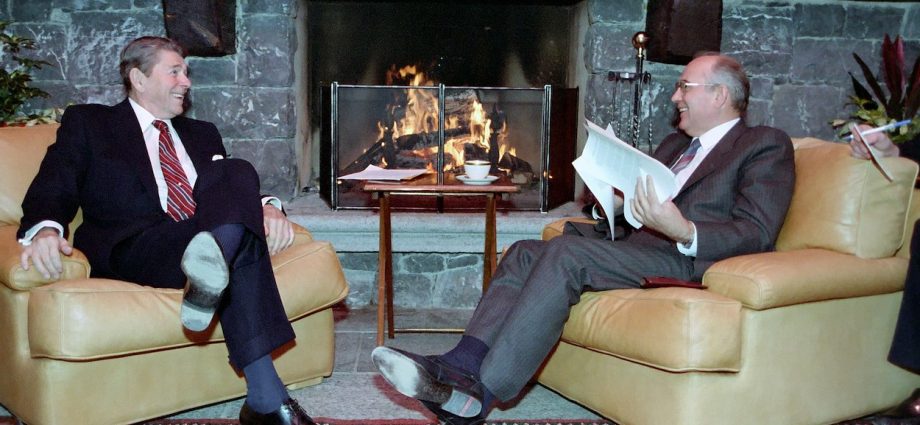
How does one judge a man who heralded epochal changes to the global order but died in a world no better than what he had inherited as one of the two most powerful men on the planet?
Mikhail Gorbachev, who died on August 30 aged 91, will remain an enigma forever. Across the political divide and global fault lines, interpretation of his vision, leadership qualities, achievements or lack thereof, and understanding of the complex union of republics he led will generate a mosaic of contrasts for ages.
Western leaders hail him as the statesman who ended the Cold War and led his country to the sunshine of democracy. French President Emmanuel Macron called Gorbachev “a man of peace whose choices opened up a path of liberty for Russians.” US President Joe Biden said he was “a man of remarkable vision.”
What about Russia? After all, the welfare of Gorbachev’s own people has to be the key yardstick to assess his legacy.
From President Vladimir Putin’s much-delayed, and rather subdued, condolence message to reactions on the Russian streets, one gets a very different perspective. Reuters reported a middle-aged man as saying, “He did a lot of damage to our country. We are the ones facing the consequences now.” A woman said, “We are hostage of his stupidity … may God not judge him severely.”
President Putin, who in 2005 termed the collapse of the USSR the “greatest geopolitical catastrophe of the century,” did not attend Gorbachev’s funeral. The last leader of the communist era did not even get a customary state funeral.
Gorbachev’s perestroika led to the reunification of Germany but triggered a breakdown of his own country – the USSR. The constituent republics’ history and cultural differences notwithstanding, no one saw it coming.
Within the subsequent Russian Federation, the divide between the ultra-rich and the have-nots widened far beyond comfort.
As a Russian citizen from Ekaterinburg told me a few years after the breakup of the USSR, “Earlier the supermarket shelves were empty, but our fridge was full; now the supermarket shelves are full, but our fridge is empty!”
Glasnost – a well-intentioned vision to bring openness and transparency in governance – was romanticized in the West. But at home, it only helped seven decades of bitter grievances to surface in ugly shapes.
That “freedom” is in shambles today, with clampdowns on basic democratic rights and leading opponents of the post-Soviet regimes behind bars.
None so blind …
Vision and intent cannot be the absolute measure of a leader’s success. Mikhail Gorbachev was an unlikely product of the Soviet Communist Party machinery. He stood tall among his contemporaries who rarely dreamed beyond what they saw.
However, it seems Gorbachev did not have a good understanding of the ground realities. He couldn’t foresee that his policies would fuel the dormant aspirations for independence in the republics that constituted the USSR.
He set out to do things that probably were the need of the hour for sustainable progress and happiness for his fellow citizens, the world, and posterity. But he misread the dynamics and underestimated the cross-currents within his own country. He failed to spot the predators behind the welcoming faces of Western leaders.
(Gorbachev realized this much later. While supporting Putin on the annexation of the Crimean Peninsula, he lambasted the West for its “euphoria and triumphalism” over the disintegration of the Soviet Union.)
He prioritized political reforms over the much-needed economic overhaul. To top it all, he was in a hurry.
The far-reaching consequences of his revolutionary actions are not pretty. In his six years at the helm – 1985 to 1991 – Mikhail Gorbachev presided over events that ultimately led to more than 200,000 people killed in civil and intra-republic wars alongside the collapse of a gigantic Union. There were well-documented war crimes, including genocides.
These bloodbaths were unleashed on people who had co-existed in the pre-Gorbachev era. In a subtle acknowledgment, he wrote in Rossiyskaya Gazeta a quarter of a century later, “My conscience is clear. I defended the Union until the end, acting through political means.”
He imagined a new international order where his efforts would be reciprocated by others. That proved to be naive. The North Atlantic Treaty Organization – in essence a military bloc created to counter the USSR’s spheres of influence – has expanded to nearly Russia’s doorsteps with 14 new member countries.
The US, the only remaining superpower, has unilaterally (at times with a motley allied bloc) launched military actions around the world for America’s own strategic purposes. Russia has often been ignored or slighted by international organizations – on Kosovo and Libya, for example.
Adieu, Mikhail Gorbachev. You meant well.
Follow Jayanta Gopal Borpujari on Twitter @borpu2.

